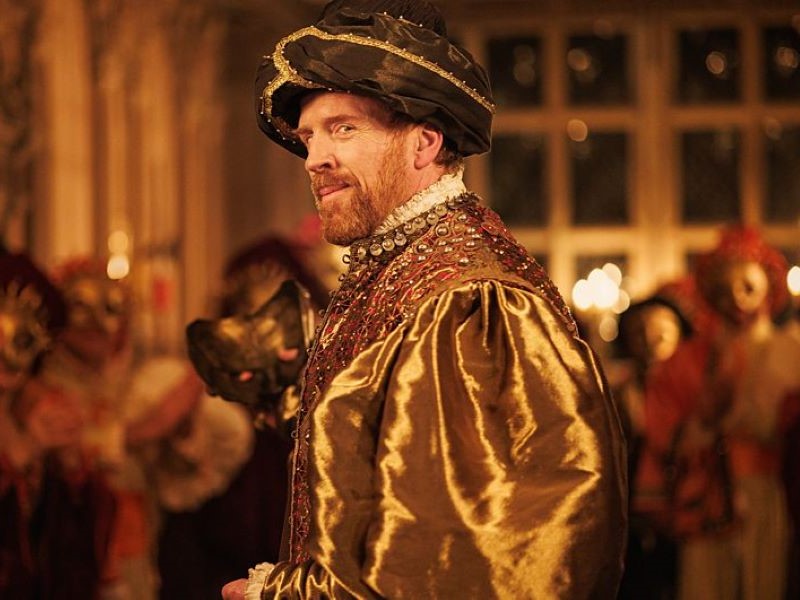– Shadow of the Axeman –
by Pat Stacey | Irish Independent | November 7, 2024
Five out of Five Stars
The second instalment of the TV adaptation of Hilary Mantel’s famous book returns to BBC1 on Sunday, November 10 and covers the last four years of Cromwell’s life.
One of the rare negative reviews of 2009’s Booker Prize winner Wolf Hall, the first in the late Hilary Mantel’s trilogy of novels offering a sympathetic take on the rise and fall of Henry VIII’s right-hand man Thomas Cromwell, came from critic Susan Bassnett.
Writing in Times Higher Education, Bassnett said: “Mantel just wrote and wrote and wrote. I have yet to meet anyone outside the Booker panel who managed to get to the end of this tedious tome.”
I have to say, I’m with Bassnett on this one. Mantel’s piling on of minuscule detail after minuscule detail eventually defeated me. I just couldn’t warm to Wolf Hall and abandoned it after about 150 pages.
To be fair, I was probably spoiled by having first watched writer Peter Straughan and director Peter Kosminsky’s superb 2015 TV version, which miraculously compressed the first and second book of the trilogy, Bring Up the Bodies, into six hours of addictive, immaculately crafted drama.
A decade later, Straughan and Kosminsky wrap the story up with Wolf Hall: The Mirror and the Light (BBC1, Sunday, November 10), based on the final book, covering the last four years of Cromwell’s life.
A lot has happened since the last time we were at the court of King Henry VIII (Damian Lewis, once again a wonderfully menacing presence).
Mantel died in 2022. Naturally, many of the returning cast, including Mark Rylance as Cromwell, have noticeably aged – although Thomas Brodie-Sangster seems, like Benjamin Button, to grow younger every year.
Surprisingly, Jonathan Pryce is back as Cardinal Wolsey, Cromwell’s one-time master, who materialises from beyond the grave intermittently to offer his old “butcher’s dog” some wise counsel.
Some recasting was necessary. Timothy Spall replaces the late Bernard Hill as the brutish Duke of Norfolk. With Tom Holland’s career riding high as Spider-Man, Charlie Rowe takes over as Cromwell’s son Gregory. Harriet Walter rather than Janet Henfrey is now the scheming Lady Margaret Pole.
Not all the changes are seamless. Karim Kadjar errs on the hammy side as French diplomat Eustace Chapuys, previously played by Mathieu Amalric.
Ultimately, this is of little consequence because the moment you start watching, the years just seem to melt away. This final six-parter looks and feels like it could have been shot back-to-back with the original. Once again, it was filmed using mainly natural light and candlelight.
The story picks up exactly where it left off. We get a recap of the execution of Anne Boleyn (Claire Foy), who’s decapitated by sword at the very moment Henry slips a wedding ring over the finger of his latest, soon-to-be late wife Jane Seymour (Kate Phillips).
When Gregory, visibly shaken by what he’s just witnessed, asks his father if it had to end this way, Cromwell tells him: “When negotiation and compromise fail, then your only course is to destroy your enemy. Before they wake in the morning, brave, have the axe in your hand.”
Rylance delivers this line, as he delivers most of them, impassively. You can never tell what emotions are swirling behind those hazel eyes, yet you know the wheels are always turning – he’s always calculating the odds.
Cromwell, who’s been promoted to Lord Privy Seal, which has perhaps sown a little complacency in him, needs his skills of calculation to be at their sharpest when Henry, more dangerously capricious than ever due to his gradually worsening health, gives him the task of persuading his recalcitrant daughter Lady Mary (Lilit Lesser) to sign an oath recognising him as head of the Church.
Henry makes it clear he wants a “conclusion” to the matter. The implication is clear: if necessary, kill her.
Throughout the first Wolf Hall, Rylance made Cromwell an ultimately unknowable figure.
This time, tiny cracks are showing in his shield. He’s more emotional, more prone to bursts of anger and displays of physical force, and even a little looser in his talk – a dangerous habit when enemies are lurking everywhere.
From the outset, what gives the drama its tension is the knowledge that the shadow of the axeman is never far away. A riveting return, worth the 10-year wait.
Read the rest of the original article at Irish Independent
